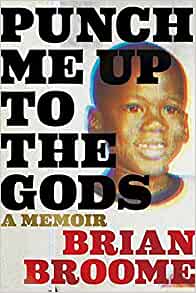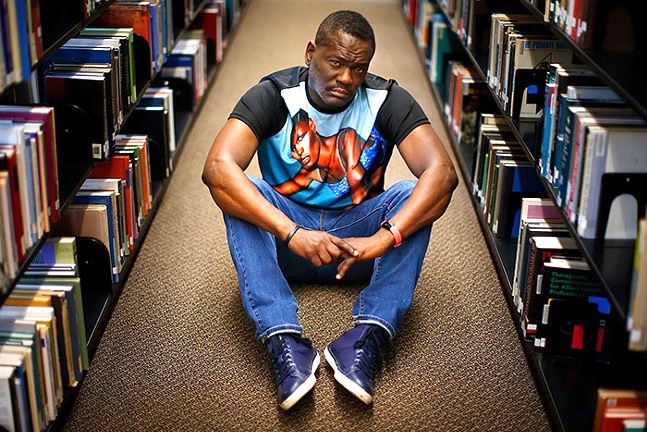 PUNCH ME UP TO THE GODS
PUNCH ME UP TO THE GODS
A Memoir
by Brian Broome
Houghton Mifflin Harcourt
250 pages, $26.
BILLED as a “memoir” in the subtitle, Punch Me Up to the Gods has the artful structure of a novel. Author Brian Broome begins with the book’s framing narrative: A gay Black man recounts his bus ride through modern-day Pittsburgh. He observes and occasionally interacts with some of the passengers. They and some of the places he notices through the window trigger memories of difficult experiences he had growing up poor, Black, and gay in industrial northeastern Ohio and later in Pittsburgh. These recollections constitute discrete episodes held together by the bus ride. At the end, we learn that the bus took him to the airport for a flight to France. Like James Baldwin and other African-American artists, the narrator moves there to escape American racism, one of the things that made his youth so difficult.
The lavish, and justified, praise that this book has received makes it clear that the power with which the narrator recounts these memories has convinced reviewers that they must come from the author’s own youth. (Oddly, the subtitle “A Memoir” appears on the dust jacket but not on the title page.) The blurbs speak of “truth … a masterpiece of a memoir”; “essays focusing on key moments in [Broome’s] life”; “unflinching honesty … a necessary testament of [Broome’s] refusal to allow the strangling expectations of life to rob him of his personhood”; “deft honesty”; etc. But their praise also suggests that much of the book’s merit resides in its autobiographical honesty.
I disagree. We have read such stories before. Whether they tell us anything about the author isn’t important. The very real merit of this masterpiece lies not in any autobiographical veracity but in the art with which it was composed. Broome clearly knows the classics of 20th-century Western literature.
(He teaches in the U. of Pittsburgh English Dept.) He has used some of the greatest of these works to structure his text with a technical bravura that might be overlooked by readers caught up in the “veracity” of these “essays.” The first clear structuring model is James Joyce’s Ulysses, which recounts Leopold Bloom’s day-long stroll through Dublin. The finale is Bloom’s wife Molly’s lengthy stream of consciousness in which she regrets having sacrificed some of her dreams and aspirations to remain with her unromantic and unfaithful husband. Near the end of Broome’s memoir there’s a long interruption in the narrator’s voice during which his mother reflects in stream-of-conscious style upon her life, including problems with her alcoholic husband, and regrets having sacrificed her own life to stay with him. The change of narrative voice allows us to discover how many of her hopes and aspirations her son seems never to suspect. That is particularly telling, because the mother’s situation is so similar to his. She has suppressed so much of what she desired because she, like him, was persuaded by social pressure to conform to the role that society had prescribed: that of the supportive wife who sacrifices her desires to those of her husband, even when he is physically and emotionally abusive. The neighborhoods through which the bus moves and the individuals who board and interact with each other trigger memories of difficult episodes in the narrator’s youth. This recalls Marcel Proust’s In Search of Lost Time, a 4000-page novel about the workings of memory. The first recollection of childhood in Proust’s narrative involves himself as a boy waiting for his mother to come give him a goodnight kiss. When something interrupted this routine, he would have a nervous attack, sobbing convulsively. His father would scold him, frustrated that his male offspring couldn’t control his emotions. Broome’s narrator’s first recollection is clearly a reference to that scene. In it, his father regularly beat him for crying, for not “being a man.” So often did it happen, and so greatly did it complicate the narrator’s coming to terms with his gender-bending homosexuality, that he terms the repeated scene “one of the very conditions that have dogged my entire existence: this ‘being a man’ to the exclusion of all other things.” Broome’s memoir alludes to other significant scenes in Proust. His narrator recalls how, as an adolescent, he used to stand beneath the curtained windows of a boyfriend’s house, wondering if he was inside with another man. This evokes Proust’s Charles Swann. Hopelessly in love with a courtesan, Odette de Crécy, he too paced back and forth beneath her shuttered windows, wondering if she was there with someone else. Swann justified his infatuation by assuring himself that he would save her from her lesbian tendencies. Broome’s narrator’s adolescent self believes that he will save both his boyfriend and himself from their drug- and alcohol-debased lifestyle. Again, the literary parallel emphasizes how much worse life is for Broome’s characters than for Proust’s. Similarly, Proust’s narrator is fascinated when, one day, eating a madeleine while drinking tea reminds him of a long-forgotten scene from his childhood. Broome’s narrator sometimes struggles to keep his awful youth memories from surfacing. He stands no chance, however: one of the nurses he deals with is named Madeline, and one of his gay acquaintances appears with a “Marcel wave” in his hair. Reviewers have largely accepted the claim that such episodes in Broome are memoirs or even “essays” about his life, but it seems possible that some might have been borrowed or embellished for literary purposes. Did Broome really have a run-in with a stereotypically racist redneck driving a pick-up truck, for example, or did he dramatize that scary episode to heighten our understanding of why Black men may be mistrustful of whites? All this is to say that Broome’s fascinating and powerful work reads more like an artfully constructed novel than a conventional memoir. It is certainly a remarkable example of either genre, and the book’s reception by readers and critics speaks for itself. The stories are honest and true to the working-class African-American—and sometimes gay—experience regardless of how one chooses to approach this book.
Richard M. Berrong, professor of French literature at Kent State, is the author of Pierre Loti (Critical Lives, 2018)




